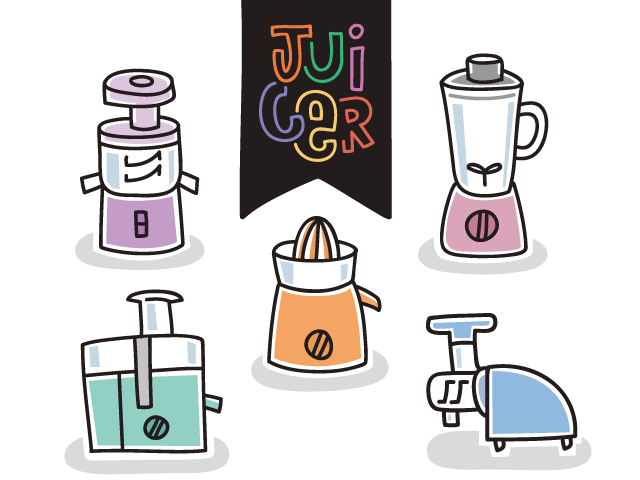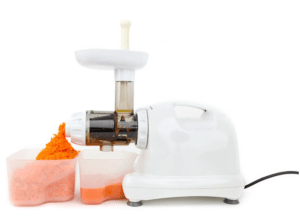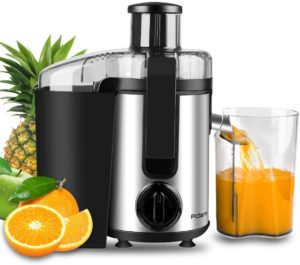
Masticating Juicer Vs. Centrifugal Juicer: Which One Is Better?
Masticating and Centrifugal juicers both have their uses and get utilized for specific purposes.
Consumers who have limited time on their hands and live a hectic schedule prefer the fast juicer. In contrast, consumers with ample time to dedicate to their health plans like to take it easy with the cold-press machine.
Although, you may wonder if the two juicers get pitted against each other, which one would fare better?
This comparison is precisely what we are going to address in this intriguing Masticating Vs. Centrifugal juicer article. So, let’s find out!
Masticating Juicer

A brief note on the features and functionality
It is essential to have a general idea of the various features that a masticating juicer furnishes to gain a better comparison of results. Here is a brief explanation:
-
General function
A masticating juicer gets used to extract juice from fruits and vegetables by either reducing or removing the fiber content. It can also process simple concoctions for making pasta or chopping hard vegetables down to size. Further, if needed, the masticating juicer provides power grinding to produce consistent results in its own time.
-
Load diversity
The cold-press juicer can process anything from bulky vegetables, flimsy green leaves to all sorts of soft and hard fruits.
-
Speed of function
Since the masticating juicer gets geared to provide consistency over time, it does not require as much horsepower. The powering capacity can be anywhere from 40 to 100 rpm.
-
Oxidization rate
General food oxidization is known to cause loss of nutrients. Oxidization of the masticating juicing process is no different. The slow extraction process ensures low oxidization rates.
-
Degradation time
Your juices and purees that get extracted from a masticating juicer will stay fresh a little under 72 hours.
-
Juice quality
With a masticating juicer, you get high-quality juice extracts with almost little foam formation. The reduced foam implies that your juice will remain suspended consistently with the water content and separate slowly.
-
Juice yield
While the juicing process in a masticating juicer is slow, it ensures more juice gets extracted from the fiber content. Hence, the pulp you obtain is dry with more juice yield.
-
Noise level
The low horsepower of the motor of a masticating juicer leaves no room for ear-banging grinding noises. In short, the noise level is acceptably low.
-
Weight
Masticating juicers utilize multiple components to deliver satisfactory results. Hence, their general weight leans to a higher value, varying from 12 to 20 lbs.
-
Cleaning time
Considering the multiple components to clean, it can take anywhere up to 7 minutes to spotlessly clean your masticating juicer.
-
Target audience
The masticating juicer gets well suited to large families and passionate juice-a-holics seeking to reap the full benefits of cold-pressed juice.
-
Price
The inclusion of additional components in the masticating juicer takes the price tag comparatively higher, from $200 to $1,500.
The masticating juicer is a compactly built machine that employs an auger to crush the fruits and vegetables. Food material gets fed through a narrow chute landing between the auger and a mesh-screen.
The auger then works its way forward, slowly crushing the produce, filtering the extract through another screen into a juice channel. The crushed pulp gets pushed into a separate container that holds only the dry pulp.
Centrifugal Juicer

A brief note on the features and functionality
As with the masticating juicer, here is a brief explanation of the features that a centrifugal juicer has:
- General function
You can whip up your centrifugal juicer to swiftly extract the juice from the produce by either reducing or removing the fiber.
-
Load diversity
A centrifugal juicer is best for the juicing of fruits, all types, and thick-skinned vegetables. It does not function as well with leafy greens.
-
Speed of function
Centrifugal juicers are better known as the fast juicers since they take comparatively less time to churn out your desired juice. Hence, they require a horsepower that can raise the rpm from 3,000 to 10,000 rpm.
-
Oxidization rate
Fast juicing usually results in a comparatively higher loss of nutrients due to the generation of heat from quick juicing. Hence, the oxidization rate in a centrifugal juicer is moderate.
-
Degradation time
With a moderate oxidization rate backing the centrifugal juicing process, the juice can remain fresh for a few hours after the extraction.
-
Juice quality
The centrifugal juicer mainly provides quick-stop solutions to your juicing needs. These solutions imply that the quality stays fresh and tasty only for a lesser period, hence falling under a moderate standard. Additionally, the juice that gets extracted sees more foam formation and separates quicker from the water content.
-
Juice yield
Since the centrifugal juicer employs higher juicing speed, the yield is considerably more. However, the pulp remains markedly wet when it gets removed from the juicer.
-
Noise level
When you employ swift centrifugal juicing, you can expect the motor to make an appreciable grinding noise during operations. The level of noise can get ranked as moderate to high.
-
Weight
The advantage of centrifugal juicers is the swift functioning they provide with lightweight models. Thus, the weight range of a centrifugal juicer varies from 8 to 15 lbs.
-
Cleaning time
A centrifugal juicer does not employ any additional component to gain optimum results. Hence, you only require a maximum of 7 minutes to spotlessly clean every nook and cranny of the juicer.
-
Target audience
The quick juicing you get from a centrifugal juicer is ideal for the morning joggers, office workers, and juicing beginners. Just feed, grind, pour, and enjoy the minute-made fresh juice.
-
Price
Centrifugal juicers cost comparatively lower since they do not employ any high-end features. The simple juicing a centrifugal juicer furnishes costs you around $40 to $150.
In a centrifugal juicer, you feed the produce into a wide nozzle and down into the grinding chamber. Here, a sharp-toothed cutter mashes the produce into a pulp while spinning at high-speeds to centrifugate the contents.
The pulp gets pushed separately into one side while the juice pours out of a juice-outlet.
Masticating Vs. Centrifugal Juicer Comparison
There exist multiple factors based on which we can differentiate the benefits of a masticating juicer from a centrifugal juicer. Here, we will consider three main criteria that affect the juice quality from both the juicers. Since what we expect from
them is high-grade juicing services, let’s begin.
Juicing Procedure
The masticating juicer employs an auger for a slow extraction process. This slow action allows the produce to get crushed effectively, extracting every drop of dense nutrient. The fiber gets stored separately and is as dry as a wasted husk.
This mechanism of a masticating juicer allows for better nutrient extraction from leafy greens. The more time that gets taken to crush the greens into a dry pulp, the better the result.
In contrast, the centrifugal juicer operates by crushing and mashing the produce in a spinning chamber. While the sharp blades effectively chop the produce down to size, the centrifugation process separates the juice and pulp.
However, there is still a sizable quantity of nutrient and water content left in the pulp. This result gets noticed from the apparent wetness of the centrifuged pulp.
Hence, a masticating juicer yields more nutrient-rich juice than a centrifugal juicer does. Also, the masticator juicer works wonders on green leaves as compared to the centrifugal juicer.
Freshness of the juice
A masticating juicer works with a reduced 60-100 rpm. This lower rpm allows the auger to extract all nutrients productively from the produce. This slow speed of churning implies less exposure to heat and air, consequently reducing the oxidization rate.
In fact, there is remarkably lower production of heat in the masticating juicer, whose absence preserves the freshness of the juice. Nutrients and healthy enzymes remain intact in the extracted juice, making it taste just-juiced fresh!
The centrifugal juicer, however, blends and churns at high speeds to separate the juice from the pulp. The spinning speed of close to 12,000 rpm generates a high amount of heat that ultimately affects the juice quality.
There is more exposure to heat and air that causes faster oxidization, thereby reducing the freshness of the juice. With brisker results, you get immediate juices that do not taste as fresh as the quality from a masticating juicer.
Juice Preservation limit
Another plus point of a masticating juicer is the longer shelf-life it provides to the juice. You get consistently infused juices that are equal parts of nutrient and water density. The anti-oxidation aspect of the juice acquired from a masticating juicer allows it to last 72 hours with proper refrigeration.
In a centrifugal juicer, you will find the juice quickly separating from the water content, leaving the dense nutrients at the bottom. Also, you have to immediately consume centrifugated juices to taste some semblance of taste and freshness in them.
No matter how much time the masticating juicer takes, it makes for a better choice over a centrifugal juicer concerning the juice quality.
Summing up
From the above-detailed comparison, it is clear that a masticating juicer is considerably superior to a centrifugal juicer.
Both the masticating and the centrifugal juicers are best-in-class products that furnish distinct benefits and drawbacks. Comparing them is merely a guideline to judge which juicer suits your needs better and requires appropriate investment.
Hopefully, this article will help you make an informed decision when you are out to purchase a juicer per your requirements.
https://brazenkitchen.com/masticating-juicer-vs-centrifugal-juicer-which-one-is-best/

No comments:
Post a Comment